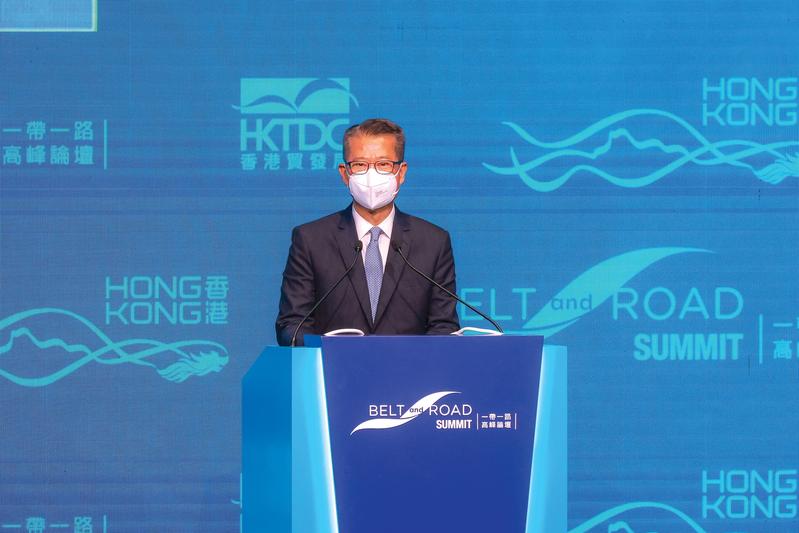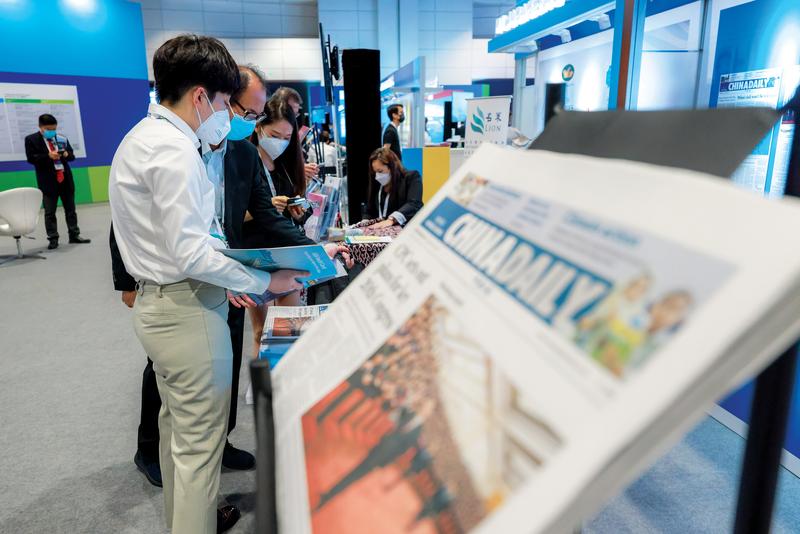 Hong Kong Financial Secretary Paul Chan Mo-po gives a speech at the “Business Plenary: Collaborate for a Bright New Era” section. (ANDY CHONG / CHINA DAILY)
Hong Kong Financial Secretary Paul Chan Mo-po gives a speech at the “Business Plenary: Collaborate for a Bright New Era” section. (ANDY CHONG / CHINA DAILY)
The accelerating green transformation in the Guangdong-Hong Kong-Macao Greater Bay Area will create more opportunities for transition finance, but greater efforts should be made in setting up international standards and managing greenwashing risks to promote its healthy and sustainable development, industry leaders said at a forum on Thursday.
With China having pledged to peak its carbon dioxide emissions by 2030 and achieve carbon neutrality by 2060, Rami Hayek, senior adviser at the external department of the Hong Kong Monetary Authority, noted that transition finance opportunities lie in the Greater Bay Area, as carbon emissions from energy production still account for 39 percent of the total in the region, and heavy industries accounting for 20 percent.
Unlike green finance, whose proceeds are used to finance an environmentally friendly project or purpose, transition finance provides financial support to help high-carbon companies reduce carbon emissions based on long-term strategies.
Qu Kang, managing director of sustainability strategy at Bank of China (Hong Kong), echoed Hayek, pointing out that over 700 infrastructure projects, such as railways and subways, are under construction in Guangdong province, which means there is tremendous space for the southern region to go green.
Industry structure upgrading to renewable energy and digital sectors in the Greater Bay Area could generate opportunities for transition finance, Qu said. “For example, the use of hydrogen energy will create new ecosystems and industries with an expectation of high growth.”
When issuing transition finance products, however, he warned of greenwashing risks — referring to a company or an institution deceiving customers into believing their products are sustainable. “Greenwashing risk could bring huge reputational (damage) and other risks,” he said.
While there are no common definitions available to describe what transition or green finance are, “my advice to financial institutions is (to) put greenwashing risk management in place before starting to (do) your business,” he said.
 Participants visit the China Daily Hong Kong booth during the summit. (ANDY CHONG / CHINA DAILY)
Participants visit the China Daily Hong Kong booth during the summit. (ANDY CHONG / CHINA DAILY)
Mushtaq Kapasi, managing director and chief representative of Asia Pacific at the International Capital Market Association, said common guidance should be set for issuers to be credible in the international market when they try to raise money for their transition.
Four key elements should be considered when issuing sustainable financial instruments, he added. They include the issuer’s governance; the business model of environmental materiality, “which means the issuer’s transition pathway has to be directly related to its business”; the science-based climate transition strategy, including clear targets and pathways; and the transparency in implementation.
Francis Ho, senior director of group treasury and project finance at CLP Holdings, said companies’ transition strategies should not only recognize the nation’s carbon-neutral goal but also serve as key pillars in supporting the decarbonization of the wider economy.
“We have a strong belief that when electricity becomes carbon-free, it will become a clean energy source to enable other industries, such as transportation and manufacturing, to decarbonize,” he said.
“In the transition to low carbon energy, it requires that the replacement technology will come in a cost-effective way to ensure the communities can continue to have access to affordable energy that shows the list in the long term,” Ho added.
Experts exchanged their views at the forum themed “Striving towards a Sustainable Future: the Role of Transition Finance”, which was one of the sessions at the two-day Belt and Road Summit. The annual event, which started on Wednesday, was co-organized by the Hong Kong Special Administrative Region government and Hong Kong Trade Development Council.
tianyuanzhang@chinadailyhk.com


